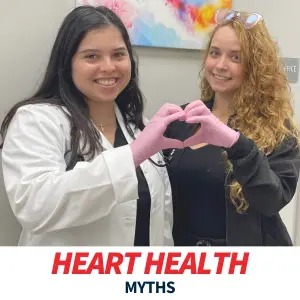October is Breast Cancer Awareness Month, an annual event that works to support and educate the public about a disease that affects millions of lives. From pink ribbons to fundraising walks, supporters of Breast Cancer Awareness Month are dedicated to promoting early detection and advocating for breast cancer research and treatment. In the spirit of increasing awareness, read on to learn about some of the most common misconceptions about breast cancer and discover the truth behind these myths.
Breast Cancer 101
Breast cancer is the most common form of cancer among women in the U.S., with approximately 1 in 8 women being diagnosed during their lifetime. While it predominantly affects women, men can also be diagnosed with breast cancer, though it’s much rarer in males than in females. When it comes to treating breast cancer, early detection is key. Regular breast cancer screenings, including mammograms, clinical breast exams and self-exams, allow for earlier intervention and often less invasive procedures.
3 common misconceptions about breast cancer
Despite efforts to educate the public, there are still some common misconceptions about breast cancer. Here are three most common myths, along with the facts that debunk them.
Myth #1: Only women with a family history of breast cancer are at risk
It’s a common belief that only those with a family history of breast cancer are at risk, but the truth is that most women diagnosed with breast cancer have no family history of the disease. In fact, nearly 85% of breast cancer cases occur in women with no known family history of the disease. While having a family history can increase your risk of breast cancer, it’s just one of several key risk factors, including age, lifestyle and genetics. That’s why regular breast cancer screenings are vital for all women, regardless of family background.
Myth #2: Mammograms can cause cancer
There are some people who believe that the radiation exposure from mammograms can increase the risk of developing breast cancer. However, the amount of radiation in a mammogram is quite minimal and the benefits of early detection far outweigh any potential risks. Mammograms are one of the most effective tools for detecting breast cancer early, often before any noticeable symptoms appear. The earlier breast cancer is detected, the higher the chances of a successful treatment.
Myth #3: Breast cancer always forms a lump
It’s a common myth that breast cancer always manifests as a lump, making it easier to identify through self-exams. While lumps are one of the most significant signs of breast cancer, not all breast cancers present this way. Some forms of breast cancer may cause other symptoms, such as swelling, nipple discharge or changes in skin texture. That’s why routine screenings and mammograms are critical, as they can detect breast cancer before prominent physical symptoms arise.
How to get involved in Breast Cancer Awareness Month
There are a variety of ways to get involved in Breast Cancer Awareness Month, from participating in fundraising events to sharing educational materials on social media. Here are a few ideas to get you started.
- Join a fundraising walk or run: Organizations like the American Cancer Society and Susan G. Komen host fundraising walks and runs. By taking part in one of these events as a volunteer or a participant, you can help raise funds for breast cancer research and support services.
- Donate: Many charities and research organizations work tirelessly to enhance breast cancer prevention and treatment options. Even a small donation can make a significant impact for these organizations.
- Spread awareness on social media: Share relevant information about breast cancer, particularly the importance of regular screenings, on your social media platforms. Sharing valuable knowledge about breast cancer with your friends and family can help start an important dialogue about breast cancer and may even be the catalyst for someone in your social network to consider getting a breast cancer screening.
Join the fight to end breast cancer by making your health a top priority
Breast Cancer Awareness Month is not just about wearing pink or joining a walk — it’s about making a real difference in the lives of those closest to you. By dispelling myths about breast cancer, promoting awareness and supporting those affected by the disease, you can play a part in the fight to end breast cancer for good.
One of the most important things you can do right now to take part in the fight against breast cancer is to prioritize your health and wellness. Get a wellness checkup at Midwest Express Clinic today — find urgent care near you at midwestexpressclinic.com/locations.




